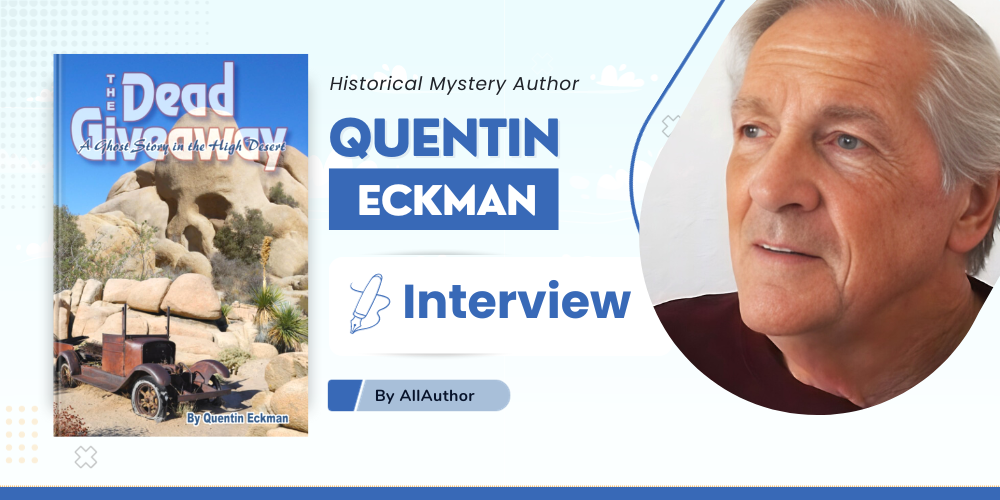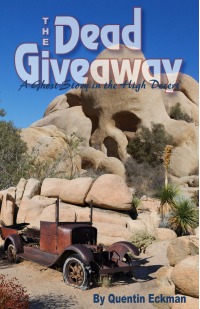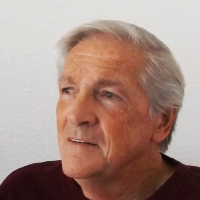Quentin Eckman Interview Published on: 21, Sep 2023
 What was your childhood like? Tell us your fondest memory.
What was your childhood like? Tell us your fondest memory.
I grew up on a small farm in rural Pennsylvania in the 1950s. I don’t have one specific fond memory. I was living the life of Tom Sawyer and Huck Finn before I’d ever heard of Mark Twain.
As a teenager, what were you obsessed with?I was a typical teenage boy. By the time I was thirteen our family had moved to California. I was obsessed with girls, sports, the Pacific Ocean, and cars. The result of those obsessions led to a shaky, less than well rounded high school education. Totally worth it? Perhaps not.
How did your experiences as a graphic artist and jewelry designer influence your approach to writing fiction?On the surface it might seem one has little to do with the other. However, both graphic art and one-of-a-kind jewelry design require meticulous attention to detail. While crafting a work of fiction, details are critical. I try to put myself in the position of the reader. I ask myself “why is that, and how do you know that “ questions. Like a work of visual art, or a sculpted work of silver and stone, the final work must make sense, and hopefully please the reader.
Your early career was marked by a range of jobs, from maintenance and auto mechanics to ranch foreman and Census worker. How did these experiences shape your perspective on storytelling and character development in your novels?I’ve been fortunate enough to meet more than a few interesting characters while employed in a variety of endeavors. Nearly every work of fiction comes with the standard disclaimer regarding persons living or dead; let’s face it most writers have little desire to be litigated. Having said that, I can say my stories are drawn from my life in some instances, but never totally literally. Enhancing a good story can turn it into a great story Most of my characters are either a combination of several acquaintances or entirely fictional.
Could you share some specific instances where your past jobs and the people you encountered inspired characters or settings in your novels, such as "The Dead Giveaway" and "The Hybrids"?The setting for the Dead Giveaway is Joshua Tree, California which at present is my home. One of the main characters, the ghost of Bill Keys, is based on an historic figure. Keys was heavily involved in the development of Joshua Tree National Park and spent five years in prison for the killing of worth Bagley. He later had his sentence reversed without the need of a second trial. Louis Price has a bit of me and a little of my father wound around several anti-heroes from fiction I’ve read (not direct thefts, but we are what we read). I didn’t intentionally base any of the characters in The Hybrids on any specific person, but the way Linda Eastland thinks reminds me of my wife.
You mentioned that you didn't realize it at the time, but your varied jobs were providing you with "living research" for your writing. Could you delve deeper into how these real-life experiences contributed to the authenticity and depth of your storytelling?First let me mention, growing old is not for crybabies. In my case, I’ve been blessed with a pretty good memory. I’ve got a great story about the time I was trapped in the photographic darkroom during the 7.1 earthquake in 1971; terrifying and hilarious! Obviously, that story is dated, but the point is I’ve been around long enough to have experienced more than a little history. The earthquake story would be made ever richer by introducing the other technical illustrators with whom I shared that building. Those guys are only a few of many talented artists I’ve had the pleasure to have known. Aside from the creative field, I’ve known a machine shop owner who could carry the protagonist role in novel with very little enhancement needed. I suppose the trick is to take something from each of the most colorful without going overboard.
In your transition from graphic arts to writing, how do you balance your creative imagination with the realism required to portray characters and events convincingly in your novels?I’m a panster. I don’t create an outline. I probably wouldn’t stick to one for long if I did. I like the “What if?” method of premise. I do draw from experience, but I’m more than willing to let my imagination run wild. I don’t mind if the story begins to lead me a bit too far afield. I’ve learned to edit ruthlessly.
What are some recurring themes or messages that you explore in your fiction?Without becoming too self-critical, I’d have to say I enjoy exploring ironic situations. I often blend a little humor into the narrative. My main goal it to entertain. If the reader learns any life lessons from my writing, that’s a plus.
Given your exposure to a diverse range of people in your previous jobs, how do you go about creating unique and memorable characters that reflect the depth and complexity of real individuals?My characters are often a blend of two or more personalities with a good deal of imagination thrown in to carry them. I like to believe that my reader will use their imagination to fill in the blanks. I use a spare writing style. I can mention a 1973 GMC pickup truck without describing the accessory package. If the reader is interested, he/she can search google images. If not, no harm done.
How do you approach the initial idea, character development, plot structuring, and revision stages?As mentioned earlier, I fly by the seat of my pants. Initially, I have a beginning and ending in mind, whether a short story or a novel. I draw from experience as far as character development is concerned, although in some cases the character comes first. In that instance I build the plot around the protagonist. I like to let my imagination go where it will. I type until I’m too tired to carry on, walk away and re-read and rewrite later. I don’t consider my prose sacred. The main objective is to write the kind of story I would enjoy reading.
What valuable lessons have you learned from your background in graphic arts and jewelry design that have contributed to your growth as a writer?While working at Lisa Frank, we sometimes used beta versions of software on computers, prone to crashing. Losing an hour or two of work happened more often that I care to remember. We lived by the mantra, “It’ll be easier to create it the second time, you already know what you did.” As far as jewelry design is concerned, I consider each piece to be a miniature sculpture. I don’t even consider the notion that everyone will love what I create. The same goes for writing, I am writing for someone, I just don’t know who that person is.
Now that your first novel is published and your second one is on the way, what have been some of the most rewarding and challenging aspects of your journey as an author?Just seeing the finished book was very rewarding. I suppose it comes down to what one considers a success. If monetary success is the goal, I’ve got a long way to go. I prefer to regard the book or story a success if my initial idea comes to fruition. The most challenging aspect of the journey, by far, is attempting to gain a following.
What advice would you give to aspiring writers who might come from unconventional backgrounds like yours?Full speed ahead and damn the torpedoes. Just write your story. Then rewrite your story. Your friends will tell you it’s good. Don’t discount their opinion, but independent criticism carries more weight. Be fearless. A failed attempt is so much better than to never have loved writing at all.
As an author, how do you hope your stories will resonate with readers? What do you want them to take away from your novels?I hope to grab them by the throat with the first paragraph and keep them engaged until the final page. Might as well shoot for the stars. I might have a message in mind, especially in The Hybrids. The reader isn’t likely to finish my book, then set about to change the world, but if they find the story entertaining, that’s a good start.
When were you first introduced to AllAuthor and how?I found AllAuthor while searching for marketing sites recommended by Dave Chesson of KIndlepreneur. I find the site to be an invaluable source for finding authors I choose to follow and read.
Quentin Eckman is a creative soul whose journey from diverse professions to the world of fiction has been as colorful as the characters and places that now grace the pages of his novels. With a background spanning a long and storied career as a graphic artist and a unique jewelry designer, he has seamlessly transitioned their artistic flair into the realm of storytelling. After a fulfilling career journey that has seen them navigate various landscapes of work, Quentin proudly presents their debut novel, "The Dead Giveaway," a testament to his newfound passion for fiction writing.
 The Dead Giveaway: A Ghost Story in the High Desert
Genre: Crime Fiction, Historical Mystery, Suspense, Mystery, Supernatural Suspense, Action & Adventure
The Dead Giveaway: A Ghost Story in the High Desert
Genre: Crime Fiction, Historical Mystery, Suspense, Mystery, Supernatural Suspense, Action & Adventure


